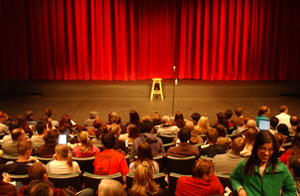
Comedy contests are literally my least favorite part of trying to make my way as a comedian. Literally my least favorite part? Yes. Literally. I have mostly been in contests for stand-up (a lot of those exist) but have also done it for sketch and improv.
The idea of one of these contests is that a series of performers (2 to infinity) will get up in front of a set of judges (real judges or, worse, the audience) and those judges will decide whether the performer is worthy of “winning.” In the case of using a set of people (who are presumably experts in some form) as judges, the contest can be relatively fair. Relatively. Comedy is an art form and probably shouldn’t be judged in this way but at least there is some level of control.
Of course, having defined judges can backfire too. I was in a contest that had the audience fill out a ballot where everyone rated each comic on a scale of 1-5. I prefer this over the other two common ways for the audience to judge: first-past-the-post and Applause-O-Meter™ (which just makes me think of Patton Oswalt in the Starsky and Hutch movie). I prefer this method because it actually allows someone to garner some support from rival audience members without those audience members feeling like they really did harm to their friend(s). However, to keep it “fair” in this particular contest, there was a secret judge who could have been anyone who worked their including wait staff, bartenders, ticket sales, or whatever that had a vote worth 10 times a normal ballot. Alright, even though that disregards anyone who brought less than 10 audience members (read: everyone). As I sat in the back of the room and played a game called “Whose Tires Do I Need To Slash?” where I figure out who the secret judge is, it became clear just who that was. It was the bus boy. The bus boy who was on duty clearing tables and whatnot, also known as not paying attention, while he “judged.” (I put two and two together when I saw the bus boy talking to the one comedian he stopped to watch and who eventually won.) Why not just spin a wheel on stage to decide the winner, then at least people can cheer on their favorite slice of the pie chart?
Contests with real judges are much less common than the other kind of contest, ones decided by the audience. These are the most dreadful kind and I have pinpointed the exact reason that these shows are never very good. Most comedy shows, people go to the show because they want to see comedy (sometimes there are crowds who come to shows and for some reason don’t really want to laugh, it’s odd but it happens). Contests, however, bring a different kind of audience than normal comedy shows. The audience is usually partially or sometimes entirely dragged along by the contestant(s) specifically so they can stack the audience. On the surface, this might look like the point of these contests and that’s because it is. Bookers want paying people in seats, it’s sort of their job. But when you drag people along to a comedy show that they don’t really want to be at, even if they want to be supportive, they just aren’t going to laugh and everyone feels awkward about it. The performer(s) feel awkward because no one is laughing and the audience feels weird because they are sitting down like it’s a lecture hall. A lot of the time, audience members will keep from laughing during their friends’ competition, thinking that this will help. In reality it just makes the show worse.
In a contest I was in a while back, the winner was determined by applause. At the end of the show, all the comics would get on stage and the host would go through each person to gauge audience reaction. This is where audience stacking comes in. A guy who spent the first minute of his set telling “jokes” to no response from even his friends (of which there were many) and then the next 3.5 minutes waiting for the light, telling him he had 30 seconds left, to go off. All-the-while, discussing how awkward it was to be on stage and how nervous he was (without being the least bit funny).
Apologists will say things like “It’s just part of the scene” and “Well, then don’t do contests.” Alright, fine, it is part of the scene and I’m not obligated to perform in them but why can’t the little guy stand up to the inequalities of the world? These contests don’t need people to stand up for them. They’re doing just fine but let’s at least question the status quo.
All that being said, not all contests are terrible. I support the Boston Comedy Festival (and check out a few of those shows every year). I also like participating in the Comedy on Tap contest at The Burren in Somerville. Just be wary of them.
